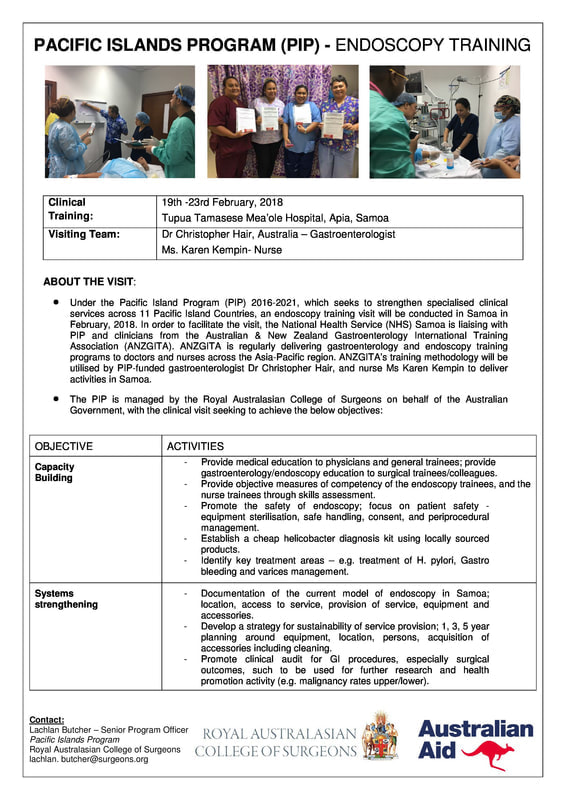Samoa
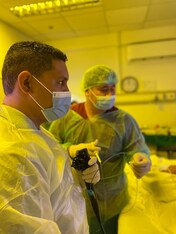
Samoa is located south of the equator, about halfway between Hawaii and New Zealand, with a equatorial/monsoonal climate. The population of just under 200,000 live on the two main islands of Savai’I and Upolu and eight smaller islands. Samoa is 104th on the Human Development Index (Fiji: 91 and Solomon Islands: 156). The capital city is Apia, where ANZGITA is partnering with the Tupua Tamasese Mea’ole Hospital (TTMH).
Our first one-week training program at TTMH was in in 2017. Due COVID restrictions no programs were held from 2020 to 2022. In 2017, gastroenterologist Chris Hair and nurse Cathy Conway, who was one of the first two nurses to be involved in ANZGITA’s Fiji programs, were the trainers. In 2018, Chris returned with nurse Karen Kempin.
The objectives of the visits are in the areas of capacity building and strengthening of the systems employed to underpin sustainable service provision over the coming years.
Our first one-week training program at TTMH was in in 2017. Due COVID restrictions no programs were held from 2020 to 2022. In 2017, gastroenterologist Chris Hair and nurse Cathy Conway, who was one of the first two nurses to be involved in ANZGITA’s Fiji programs, were the trainers. In 2018, Chris returned with nurse Karen Kempin.
The objectives of the visits are in the areas of capacity building and strengthening of the systems employed to underpin sustainable service provision over the coming years.
January 2023 Training Program
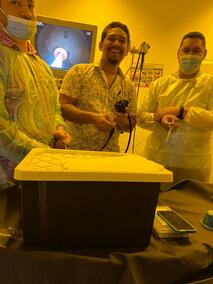 Trainees at work with the Walmsley Simulator (foreground)
Trainees at work with the Walmsley Simulator (foreground)
A productive weeklong program was held in January at TTM Hospital as usual in Apia, Samoa’s capital. 10 nurses and 3 doctors attended throughout the time. A few doctors who have trained previously joined for specific activities. Our team was 2 doctors (Chris Hair and Ian Turner) and 2 nurses (Di Jones and Karen Gower). The on-going issue of COVID infection affected this program also as Karen Gower kindly dropped everything and stepped in when Karen Kempin was diagnosed 48 hours before she was due to travel.
We used the newly released Walmsley Endoscopy Simulator which we have acquired for use at TTN hospital. It is teaching aid which we think will be very valuable in developing and assessing the fundamental skills needed in manipulating an endoscope. Evaluation will continue at TTM hospital post-program and at the Fiji program in mid-year. In the past trainers have set up training boxes “on the fly” as shown in the story further down on this page. However, they lacked the sophistication and assessment capabilities of the Walmsley product.
A bowel simulator model was also ‘built’ on the spot by Di Jones, as she and Chris Kiely had done at HNGV in the past, and the plan is to produce a sturdier version which can be taken on future programs.
We used the newly released Walmsley Endoscopy Simulator which we have acquired for use at TTN hospital. It is teaching aid which we think will be very valuable in developing and assessing the fundamental skills needed in manipulating an endoscope. Evaluation will continue at TTM hospital post-program and at the Fiji program in mid-year. In the past trainers have set up training boxes “on the fly” as shown in the story further down on this page. However, they lacked the sophistication and assessment capabilities of the Walmsley product.
A bowel simulator model was also ‘built’ on the spot by Di Jones, as she and Chris Kiely had done at HNGV in the past, and the plan is to produce a sturdier version which can be taken on future programs.
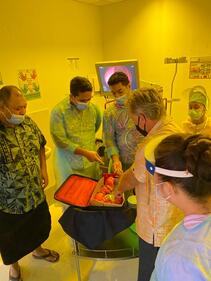 Bowel simulator model in use by trainees
Bowel simulator model in use by trainees
A Grand Rounds presentation was made by Ian Turner and one of the senior TTM doctors was tutored in training skills which were applied during the week under the guidance of the team.
Nurse training was structured to focus on activities in three areas: Admissions, cleaning room and procedure room. Competency assessment was conducted in relation to cleaning room procedures and outcomes.
At the conclusion of the week, progress was reviewed, and a top-level plan prepared for the next program later this year.
Meetings were held with the Australian High Commissioner, the Director General of the Ministry of Health and TTM hospital leadership. The support expressed for our work was most encouraging.
We gratefully acknowledge that our work in Samoa is now being supported by the Epworth Foundation.
Nurse training was structured to focus on activities in three areas: Admissions, cleaning room and procedure room. Competency assessment was conducted in relation to cleaning room procedures and outcomes.
At the conclusion of the week, progress was reviewed, and a top-level plan prepared for the next program later this year.
Meetings were held with the Australian High Commissioner, the Director General of the Ministry of Health and TTM hospital leadership. The support expressed for our work was most encouraging.
We gratefully acknowledge that our work in Samoa is now being supported by the Epworth Foundation.
Some History of our Samoa Engagement
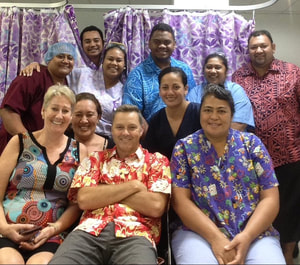 Trainers and Trainees at the conclusion of the 2017 visit
Trainers and Trainees at the conclusion of the 2017 visit
Between 2013 and 2016, 5 doctors and 5 nurses from Samoa attended the ANZGITA training program in Fiji. Under the Pacific Island Program (PIP) 2016-2021, which seeks to strengthen specialised clinical services across 11 Pacific Island Countries, one-week endoscopy training visits to TTMH have been conducted in 2017 and 2018. The National Health Service (NHS) of Samoa, the Royal Australasian College of Surgeons which manages PIP on behalf of the Australian Government and ANZGITA have worked together to plan and conduct these visits. In 2017, gastroenterologist Chris Hair and nurse Cathy Conway, who was one of the first two nurses to be involved in ANZGITA’s Fiji programs, were the trainers. In 2018, Chris returned with nurse Karen Kempin.
The objectives of the visits are in the areas of capacity building and strengthening of the systems employed to underpin sustainable service provision over the coming years. Read Chris Hair's reflection following a 2019 event.
The objectives of the visits are in the areas of capacity building and strengthening of the systems employed to underpin sustainable service provision over the coming years. Read Chris Hair's reflection following a 2019 event.
An Ingenious Training Tool
Following is an example from Chris of enginuity that ANZGITA and our partners apply in circumstances where resources and facilities are simply not available but a way has to be found. Chris' comment is, "One of the hardest techniques to teach is 'reducing the loop' during colonoscopy. In this case we've used a box to hide the loop from Dr Folo, who then attempts to reduce the loop by using the 'feel' of the scope, tactile feedback as the loop in the endoscope is first pulled back, and then rotated to straighten out. "It cost us nothing to build this simulation, yet gave a learning experience that money can't buy."
PIP & RACS Fund Endoscopy Training
Chris Hair and Karen Kempin in Samoa in March for a week (after a delay due to Cyclone Gita) to provide training and advice. Funding is by the Australian Government Pacific Islands Program which is administered by RACS.

